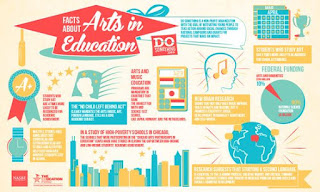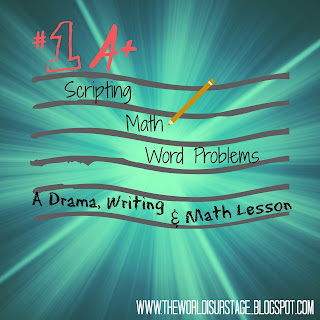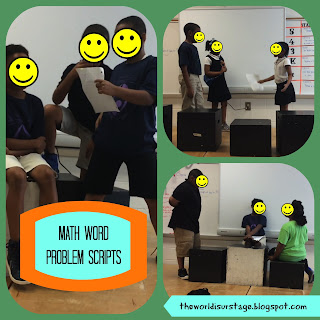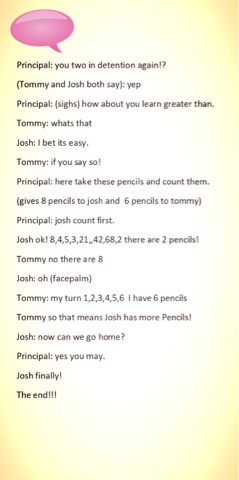1. We want what is best for your child. I have one son, but I realistically have 500 children. When your child is with me, they are my kid. I love them and I want what is best for them. I am there cheering them up before tests, encouraging them before they go onstage, and celebrating with them when they succeed. Even when something doesn't go your child's way, we are still pushing for them to succeed.
2. We are trying to be fair to all children. I once had a parent yell at me because I would not let their child redo their audition three times, because they didn't do well the first time. I tried to explain that it wasn't fair to let one child repeat their audition numerous times if we weren't going to let everyone else repeat their audition. We try our best not to play favorites. That being said, we have to try to teat everyone as equally as possible and sometimes that means setting a hard line.
3. We wish we could let everyone in the production. This year I had over 150 elementary students audition for the play. If I could, I would have had everyone in the show. But for the quality of the shows we have to put a cap on our numbers. Our stage just can't handle that many kids dancing at once, and my patience can't handle that many kids in the gym for rehearsal. Most teachers try to offer many different opportunities to perform, there will always another way for your child to be involved.
4. Tech is very important. Tech is a wonderful way for children's to develop leadership skills and independence, It is also a great place for students to contribute who aren't quiet ready to be onstage. I love tech crew. It was where I found my "Place" in the theatre world. It always breaks my heart when parents down tech theatre because their kids won't be the "star". Without tech, the actors would be standing silent in the dark.
5. We spend more time with your child then we do with our own. If you break down the amount of time I am at school (roughly 8 hours) and then add that to the amount of time we have rehearsal (usually about 2 hours) that is almost 10 hours when I'm away from home. Given that my child goes to sleep at 8PM. That really only leaves me 2 hours if I am lucky. I spend so much more time with your child on any given week. I do it because I love and care about your child. But please be respectful of my time, nothing hurts worse then when you are 2 hours late picking up your child from a rehearsal and I miss my 2 hour window to see my child.
6. We have a family and sometimes emergencies happen. I know that it is a huge inconvenience when a rehearsal gets canceled. No director cancels rehearsals "just because" but sometimes emergencies come up. My husband and I both work, sometimes when my child gets sick I have to stay home from work to take care of him. Most of my students' parents understand this, but occasionally I will have a parent who goes and complains to the principal when an emergency happens. I know that if the situation was reversed they would want understanding. That is all we want as well.
7. We love pushing your child artistically. Directors love to see what their students can do. Often these kids amaze even us with their talents and abilities. All we ask is that parents trust the process. Just because a kid comes home and says their part is too hard, don't automatically go to the director and try to get them to make it easier. We know what our students can do. No director will put an unprepared child onstage, we will get your child ready. They might just have to work harder than usual to achieve this goal.
8. We try our best not to play favorites. I do my very best not to put the same students in lead roles every show. I know students think that directors always choose the same kids but that is rarely the case. For example, I have a student who played a very minor role in the musical last year. It was a very very small role but she did a wonderful job with it. She did so well that she was one of the main characters everyone remembered. So when she was cast as a main character in the next play everyone complained that we were playing favorites. It wasn't the case, but that is how people viewed our casting because they all remembered her from the last play.
9. Your child feeds off your reactions. It happens every year. We announce the cast of every child is thrilled with their parts. Even if they have a small role in the chorus they are so excited to be a part of the production. Then they go home and their parent makes a comment about how that role is not that great. The student starts to question their part and aren't as excited when they arrive to the first rehearsal. Please remember if you are excited about a small part, they will be too. The kids just want to make you proud, show them that you are proud of their accomplishments (even if you do think they should have been the star).
10. We love what we do. Must fine arts teachers become directors because we grew up in school fine arts programs. As students, this is where we found our place and our extended family. We do our best to provide this same experience to your child. All Fine Arts students form a bond that you don't usually find in the regular classrooms (very few people talk about how their math class is their home away from home). We want to provide a place for your child where they feel safe, loved, and accepted. We want your child to feel like they are needed at school. That is why you child loves their fine arts classes so much, we help create a home away from home while your child is at school.
Bonus: We need parents' help! Being a parent of a fine arts child is rough. We know that we demand a ton from the student and family. Rehearsals after school require extra transportation requests and time away from family. Depending on the school, sometimes you need you even have to pay to rent the instrument or be in the play. We recognize your sacrifices you are making for you child and we really really appreciate it. We also really appreciate all the times parents volunteer. I cannot tell you how amazing my parents are. So many of them have come in on Saturdays to help me build sets or stayed late after plays to help load up cars and take down back drops. They have helped sell tickets and concessions, and even applied makeup and costumes. Our parents are amazing and we could not do what we do with out them.
So what did I miss? What do you wish you could tell your parents as a Fine Arts teacher?









